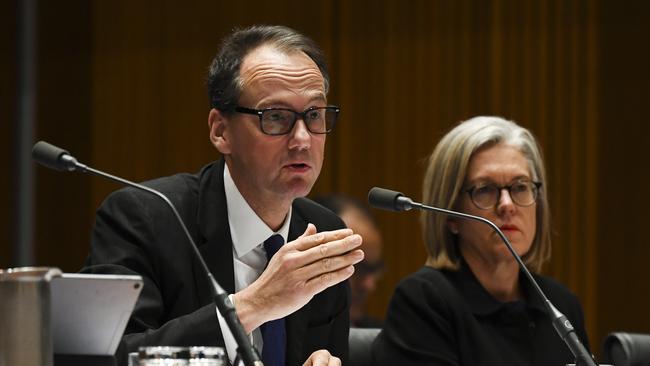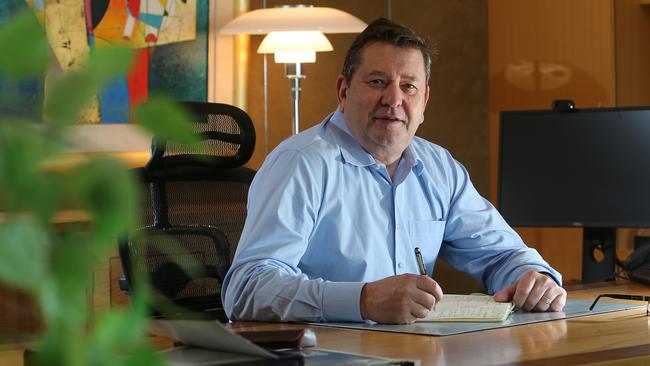
No one would argue with the first statement but there are mixed views on the second and the final judgment will only come with time.
Treasurer Josh Frydenberg is one who disagrees, having replaced him ahead of time by former ASIC executive banker and lawyer Joe Longo.
Shipton will finish at ASIC on Monday week after starting at the agency in February 2018, three months after the financial services royal commission began and ahead of last year’s pandemic which shifted the regulatory goalposts big time.
It was not a great time to be a corporate regulator. He lost his support base when Kelly O’Dwyer quit politics, and then Treasurer Scott Morrison took the top job and Shipton clearly didn’t win Frydenberg’s respect.
Managing the government is a key regulatory task that Shipton failed.
The circumstances of his departure, after an external review of the financial arrangements when he joined ASIC, will tell the story of his reign for some.
In the end external reviewer Vivienne Thom completely cleared Shipton and his deputy Daniel Crennan of any wrongdoing on the pay deals in question, but it was too late and Frydenberg used the report to engineer Shipton’s early departure at month’s end.
Shipton agreed to a lame duck term in part because he wanted to organise a suitable handover to clear the decks for his replacement.
Community service was a key reason for taking the job and the terms of his departure gave time to settle the organisation.
He didn’t get the same opportunity when he arrived, in part because he was overseas and his predecessor Greg Medcraft was heading to Paris.
The fact the whole issue was allowed to play out so publicly was a clear management failure.
But he will tell anyone who will listen that ASIC is now treated more seriously than when he started, a statement that frankly gets mixed reviews.
Shipton is now doing a final tour of duty and tells anyone who asks he has no firm plans for what he does next, but would like to do something in the financial inclusion space.
One of the things he is most proud of at ASIC is that 10 million people used the regulator’s Moneysmart website last year during the pandemic.
People were scared and used the site to help plot a financial path forward.
As a child he would visit indigenous communities with his late father Roger and he sees among those people many clear examples where the system simply doesn’t work to help them.
The royal commission relied heavily on material from both companies and ASIC.
The commission in theatrical style coined the oft-used phrase “why not litigate?”. It became the catch cry for a corporate regulator that wasn’t decisive.
The widely misused phrase was in concept correct, which is not to say court is always the best venue for settling issues, but that things needed to be seen to be done.
This said, Shipton’s track record included the infamous responsible lending action against Westpac, which arguably was the right case even though Frydenberg inexplicably moved to dump the rule without so much as a review of its terms.
Consumers can thank Senator Pauline Hanson for restoring some order on that issue by rejecting the legislation.
Shipton victories included a $57.5m penalty against NAB in the fee-for-no-service case, a High Court win against Westpac for directing clients to the in-house super fund BT, criminal charges against CBA-owned CommInsure for hawking in 2019, and successful cases against Dover Financial and Mayfair which fall into the category of corporate behaviour that shouldn’t happen again. In his time ASIC has overseen $1.24bn in consumer remediation against financial services companies.
The infamous shrink in the boardroom idea was ill-timed and it’s clearly dumb to think a behavioural expert sitting in a boardroom could read the dynamics to expose what goes wrong in companies. Far better to spend some time talking privately with directors and their direct reports.
Shipton was credited with bringing a more intellectual touch to the commission which he wanted to be seen as fair, reasonable and firm.
The aim was a fair, honest and efficient financial system and his key performance indicator was how to make the system better.
The long-running internal reform creating executive directors and eventually Warren Day as chief operating officer took its time, leaving the commission as an oversight body, accountable for decisions and strategic directions.
His oft-quoted hero was Harvard academic Malcolm Sparrow who said the key to being a good regulator was to “pick important problems and fix them”.
The trouble for Shipton was a combination of the royal commission and COVID left little clear air to be seen to have done that.
Nufarm bounces back
Buoyant farm conditions have helped Nufarm bounce back to profits for the first time in two years but chief Greg Hunt knows the cyclic game and is weighing what support is needed.
Hunt yesterday reported a 20 per cent jump in revenues to $1.7bn and a more than doubling in earnings to $233.6m.
One disappointment was a fall in salmon sales internationally due to COVID shutting restaurants, meaning lower sales of his breakthrough Omega 3 canola oil. The Omega 3 market is worth some $US3bn ($3.9bn) of which $US1.2bn is aquaculture and the rest pharmaceuticals and food ingredients.

That is the market Nufarm is hunting next, with the US approval process beginning and the hope of possible clearance in six months.
Salmon sales fell with restaurant closures and less sushi being sold.
The Australian manufacturer has a competitor in the game with Germany giant BASF but it is a couple of years behind Nufarm.
Hunt likens his sale of crop protection products to making gin and tonic, with the gin coming increasingly from China and the US and Nufarm adding the tonic and lemon twist.
China offers tax concessions to its suppliers for sales of the finished product but not the basic gin.
The way Hunt looks at it he is a manufacturer of seed, fertiliser, fuel and crop protection for the farm sector, and with supply chains in question post-COVID there is a need to maintain production in Australia.
The same logic saw the federal government pour $2.4bn into the pockets of Ampol and Viva shareholders for fuel security reasons.
Hunt figures farm security is important so maybe the feds could think of some support to the local manufacturer by way of help for training and other measures.
It’s the same essential services argument exploited by Ampol and Viva to get their handouts.
Nufarm’s stock price has bounced back to pre-COVID levels, closing on Thursday at $5.02 a share, up 2.8 per cent and against $3.37 last November.
The farm boom will maintain momentum.




Outgoing ASIC chief James Shipton believes he was a victim of being in the wrong place at the wrong time but has left the regulator more relevant than when he began.